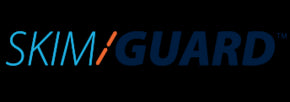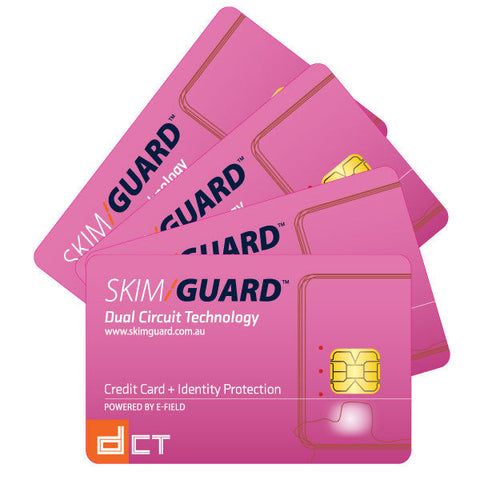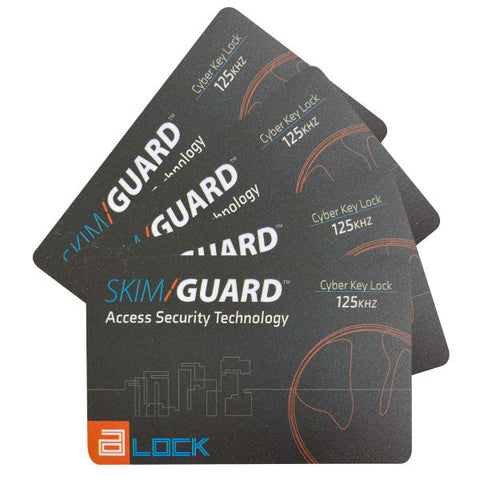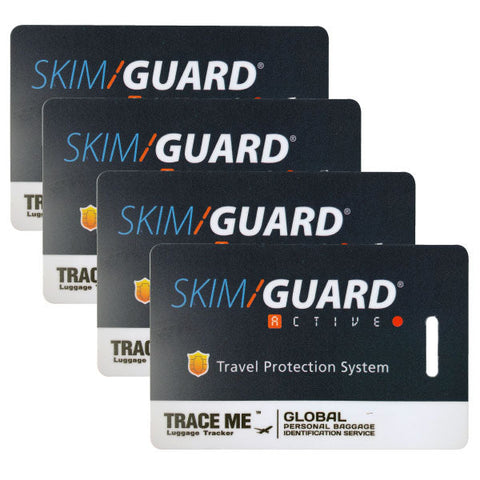Compare Cards
Get the protection you need
Skimguard manufactures various RFID cyber protection cards as well as RFID cyber protection cards under various brand names for our OEM retailers. Please note that only the Skimguard DCT card protects both the 13.56 MHz and 125 KHz frequencies. Our other cards, including Skimguard Traveller and other OEM branded cards, use the same powerful eField technology as our DCT card however only protect the 13.56 MHz frequency. Due to the surge in identity theft breaches in Australia, it is important you consider what data is stored on your various different cards and what kind of protection you require for the cards in your wallet or purse.

13.56 MHz and 125 KHz
- 13.56 MHz (HF) is commonly used in high security formats such as credit cards, badges for physical and logical access control, passports and transport cards.
- 125 KHz (LF) is a common proximity card format used for employee badges, door and gate access control, security access cards, gym cards and loyalty cards.
Comparing cards
| Card | 13.56 MHz | 125 KHz |
| Skimguard DCT | ◙ | ◙ |
| Skimguard A-Lock | ◙ | |
| Skimguard Traveller | ◙ | |
| Travel Guard | ◙ | |
| RFID Shield | ◙ | |
| RFID Blocker | ◙ | |
| Black Dog | ◙ |


At Skimguard we constantly look to remain one step ahead of current skimming trends and cyber theft advances.
Today RFID blocking technology focuses primarily on credit and debit cards, these cards sit on the RFID readable 13.56 MHz bandwidth. Loyalty cards typically sit on the 125 KHz bandwidth. Many blocking cards cannot block 2 different frequencies in the one card … but not the Skimguard DCT card. Skimguard DCT embeds 2 different blocking frequencies within the same card, both 13.56 MHz and 125 KHz frequencies within Skimguards electronic protection circuit.

Did You Know?
- The average Australian holds an average 4.4 loyalty cards in his or her wallet or purse.
- There are currently over 96 million active loyalty programs in Australia.
- There are no current federal or state regulations that govern what identity information and how that information is stored on a loyalty card.
- There is no governing body overseeing the security of data storage on loyalty cards loyalty cards may hold a wealth of RFID transmissible personal identity information about you.
It is no coincidence that we often receive that complimentary “birthday voucher” from our favourite store or club. These are result of stored date of birth and email information these programs store.

The recent Optus breach has sounded a timely warning that right now we should all be looking to further protect and secure as much of our personal identity details as we can. In light of the recent customer personal identity breaches we urge affected Optus consumers to closely monitor bank accounts, credit card transaction payments and view your Medicare online portal to ensure no false medicare refund claims have been lodged on your account. Useful information can be found on the following non commercial websites:




